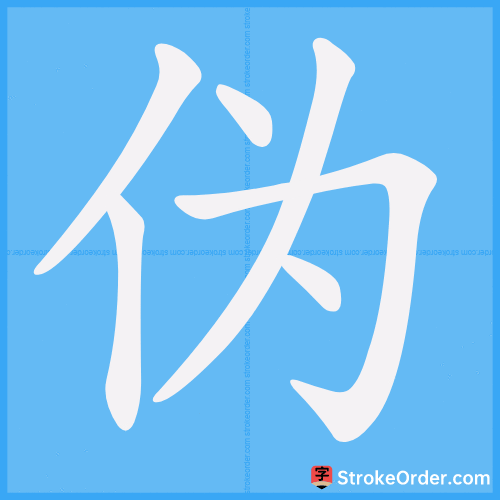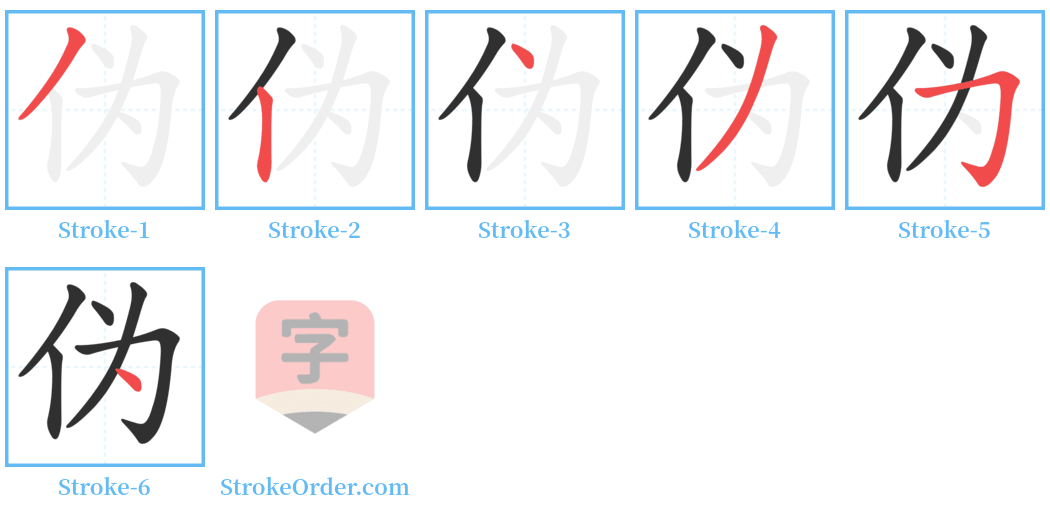伪 Stroke Order
Animated Stroke Order of 伪

Stroke Order Diagrams for 伪

Step-by-Step Handwriting Guide for 伪

Learn to Write Chinese Characters with Video Tutorials
Watch the video of writing the Chinese character "伪", learn the correct stroke order (笔顺) of the character "伪", and master the standard way of writing the character "伪".
Free Printable Handwriting Practice with Stroke Order: 伪
Printable Writing Practice Worksheet of "伪" in Portrait Orientation (Tian Zi Ge)

Printable Writing Practice Worksheet of "伪" in Landscape Orientation (Tian Zi Ge)

Information of 伪
Pinyin
wěi
Radical
亻
Strokes
6 strokes
Usage
★★★★★
Definition
false / fake / forged / bogus
伪
wěi
1. False; not real.
假,不真实。
2. Illegal; unorthodox.
不合法的。
1. False; not real: forged; fake; counterfeit; false evidence; false kindness; falsehood; separate the false from the true.
假,不真实:伪造。伪装。伪劣。伪证。伪善。虚伪。去伪存真。
2. Illegal: fake government; fake army.
不合法的:伪政府。伪军。
伪 (verb)
wěi
【Original meaning】: to deceive.
【Character formation】: a combination of meaning and phonetics. It consists of "person" and "to do", with "to do" also indicating sound.
1. Same original meaning ([En.] cheat; swindle)
同本义 ([En.] cheat; swindle)
【Quote】
1 In "Shuowen": 伪, to deceive. Xu Kai said: "伪 (wei) is something created by humans, not natural."
2 In "Liji, Yue Ling": No deception or falsehoods are allowed.
3 In "Xunzi, Nature is Evil": What cannot be learned or achieved by people is called nature; what can be learned and achieved is called 伪.
【Example】
e.g. 伪诈 (deception); 伪怠 (deceptive laziness); 伪服 (pretend to be respected); 伪人 (fake person, hypocrite); 伪巧 (sly deception); 伪臣 (deceitful minister); 伪民 (deceitful person); 伪行 (deceptive behavior).
2. Artificial; to contrive ([En.] do)
人为;矫饰 ([En.] do)
【Quote】
1 In "Xunzi, Nature is Evil": human nature is evil; the goodness in it is 伪.
3. To disguise; to pretend ([En.] pretend; feign; disguise)
伪装;假装 ([En.] pretend; feign; disguise)
【Quote】
1 In "Mencius, Wan Zhang Shang": Was Shun pretending to be happy then?
【Example】
e.g. 伪廉 (pretending to be honest); 伪行 (pretending to exhibit a behavior; to fake); 伪冒 (to impersonate; to counterfeit); 伪从 (to feign agreement); 伪让 (pretend humility).
4. To forge; to fabricate ([En.] forge)
伪造,假作 ([En.] forge).
【Example】
e.g. 伪易 (fraudulent exchange); 伪作 (to fabricate); 伪从 (to feign agreement).
伪 (adjective)
wěi
1. False; not real ([En.] false; fake)
虚假;不真实 ([En.] false; fake)
【Quote】
1 In "Liji, Zengzi Asks": The forger acts as a leader.
2 In "Zhuangzi, Qiwulun": Where does the truth hide, and what is true or false?
3 In Tang Dynasty, Liu Zongyuan's "Letter from Tongqu": A fake child cries.
4 In Tang Dynasty, Han Yu's "Editorial on Zhu Wengong": The authenticity of ancient texts.
5 In Ming Dynasty, Cui Xian's "Notes on Wang Zhongsu Gong": Forged house deeds.
6 In Qing Dynasty, Fang Bao's "Miscellaneous Notes from Jail": Family has forged documents.
【Example】
e.g. 伪言 (false statement); 伪名 (false name); 伪行 (false behavior); 伪命 (false order); 伪辞 (false argument); 伪态 (hypocritical attitude); 伪意 (false intention); 伪戾 (contrived stubbornness); 伪俗 (hypocritical trends).
2. Illegal; unorthodox ([En.] puppet; illegal)
非法;非正统 ([En.] puppet; illegal)
【Quote】
1 In Jin Dynasty, Li Mi's "Letter of Request": Moreover, I have served a fake regime for a while.
【Example】
e.g. 伪政府 (fake government); 伪组织 (fake organization); 伪庭 (fake court); 伪师 (deceptive military of unorthodox regime); 伪国 (a counterfeit country); 伪朝 (pseudo or unorthodox dynasty).
Input Method for 伪
Pinyin
wei3
Wubi
wyly|wyey
Cangjie
oiks
Zhengma
nuys
Four Corner
24227
Unicode
U+4f2a
Same Pronunciation Characters